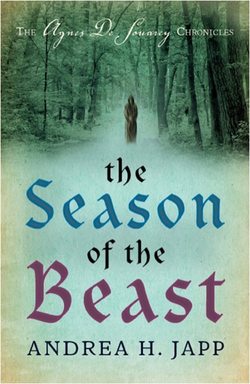Читать книгу The Season of the Beast - Андреа Жапп - Страница 13
На сайте Литреса книга снята с продажи.
Chartres, May 1304
ОглавлениеNIGHT was slowly falling. The clamour in the streets had gradually died down. It was almost supper time. The cloaked figure stepped over a pile of debris blocking the central drain and turned right into Rue du Cygne.
The foul acrid smell drifting on the breeze gave a better indication of the tavern’s location than any sign. It was one of those establishments where workers and craftsmen from the guilds gathered in the evenings – in this case the tanners’ and leatherworkers’ guild. While some fiery preachers described them as ‘dens of iniquity’ that encouraged sinful behaviour, the truth was far more benign. They were drinking places with a family atmosphere: people settled most of their deals and differences there and stopped for a welcome rest surrounded by a friendly din.
The cloaked figure paused in front of the door. Laughter and cries echoed from inside. He had deliberately arrived late so that the customers’ curiosity would not be roused by seeing a solitary figure seated at a table. The person he was meeting would then already be waiting inside. He drew his hood down over his forehead and, clasping the sides of his heavy cloak, which was far too warm for such a sultry evening, he pushed open the door.
Two steps. Two steps were all it took. An ocean; a universe. A gulf separating innocence from almost certain damnation. And yet innocence can be a burden and above all rarely profitable. Innocence affords private satisfaction; money and power simple recompense.
The cloaked figure descended the first step and then the second.
Except perhaps for a welcoming smile from one woman sitting at a table, his entrance elicited little response from the tavern’s regular customers.
Calmly crossing the trodden earth floor strewn with straw, the cloaked figure approached a table towards the back of the room, which was plunged into darkness. The man he was meeting had snuffed out the oil lamp in front of him.
The figure sat down. The hubbub of conversation around them was in full swing and would conveniently drown out the transaction that was about to take place.
The man was plump and jovial. He filled a second glass with wine and said in a hushed voice:
‘I ordered the best. Since her husband passed away, the landlady has developed the regrettable habit of watering down the drink. It’s only natural. She buys it for a few pennies a barrel from one of her nieces, a nun at Épernon. They say the abbey possesses some fine presses.’
Did he really believe that such harmless banter would detract from the enormity of the matter that had brought them there? And yet, the cloaked figure betrayed no irritation but remained silent, bolt upright, awaiting his next move.
At last, the man, a former barber-surgeon if what he said was true – that is a butcher14 of beards and of human flesh – vexed by the silence of the person opposite, slid his fleshy hand across the table. Clasped in his palm between his hairy thumb and fingers was a phial wrapped in a thin strip of paper. A second hand wearing a thick brown leather glove reached out from under the cloak to take it, and at the same time set down a bulging purse, which the barber quickly pocketed. He explained in an almost piqued, slightly menacing voice:
‘I’ve brought the instructions. It requires somewhat delicate handling. The aconite enters through the skin. It’s slower but every bit as lethal as if it’s swallowed.’
The cloaked figure stood up, not having uttered a single word, nor tasted a single drop of wine, which would have meant pulling back the hood of the cloak.
Two steps. Only two steps to climb. Back in that dimly lit room buzzing with relaxed conversation lay the past. It no longer bore any relation to the future.
The past had been inflicted, had imposed itself with all its cruel injustices. The future would be freely chosen. But first it must be fashioned.
